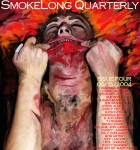We are used to hospitals, Betty and me. Three sons, two daughters, nine grandchildren, all born at Mercy General. Five sets of tonsils removed. Two appendixes. Broken arms, sprained ankles, stitches from baseballs, ratty bicycle chains, fists, fishing hooks, a paring knife. Youngest son Harold lost two fingers a couple years back. Hit his head on the weed whacker he had hanging on a peg outside his shed. Got so mad he threw the contraption across the lawn, catching his pinky and pointer on the plastic string in the process. Weight of the motor ripped them right off. Harold’s got Betty’s temper.
We are used to hospitals. Betty says you never get use to the smell.
Margaret is forty years old. A stranger. Says Daddy in a voice I don’t know. She was a beautiful infant. Some babies come out of that secret space all bruised and twisted looking. Margaret just slipped out perfect. No struggle. Nothing.
Now, Susan. Here every night, lugging my granddaughters around in that mini-van. Who ever heard of such a thing. Mini-van. Married too young. You don’t marry at eighteen. We did. People grew up faster. Susan was still a girl. Two little girls and now who’s responsible. Carrying babies on her hip at her age.
Betty’s voice is moonlight.
I run my hand down the length of my face. It smells of hospital. Soon Betty will roll over and the moon will be soft, barely there. She’ll kiss my old, wrinkled cheek and whisper ‘Ready dear?’ into my ear.
We will dress. Betty in her beige skirt and pale yellow blouse. Me in the same pants I wore yesterday. A button down shirt, the blue one. I will remove my blue cap from the hat rack. We will go. I won’t remember where I put my driving glasses so Betty will tell me. She’ll tell me not to forget my sunglasses, the ones that flip down over my driving glasses. We will go.
On the way, I will see a woman running along the street. I have seen her for the last two weeks when the day is sunny. And the day will be sunny. I will see her and think she runs like Margaret. I will think of Margaret in high school, of those expensive track shoes she wanted. I will look at the woman running, at the shoes on her feet, and think of Margaret’s shame when she crossed the finish line in her old, worn shoes. Fourth place.
Today is the day.
I will hold Margaret’s hand. I will tell her I’m so sorry about the shoes, sorry about everything and kiss her cheek. Today is the day I will kiss my daughter’s cheek with my old man lips and tell her I love her.
I have tried for a week. Every day for a week I have tried. When we walk in the sound of Betty’s high-heels will bounce around the walls on our way to Margaret’s room. I will see the number 217 on the door. Betty will enter.
Later she’ll find me on the wooden bench across from the glass holding all the strangers’ babies. She’ll sigh and her yellow blouse will rise up on her chest and brush her summer scarf. When she sits down and takes my hand in hers, the tears will drip again.
On the way home, she’ll talk new treatments, fancy bras she’s bought to hide my daughter’s new hollow space, silly conversations they’d had about movie stars and the precise amount of lime Jello Margaret kept down. Two ounces.
The moonlight has traveled down Betty’s pillow, made its way down to the old woman breasts she hides underneath her worn pink nightgown. I reach down and pull the quilt up to her chin, careful not to wake her. And sit watching that moon.


 Included in the price of SmokeLong Fitness:
Included in the price of SmokeLong Fitness: